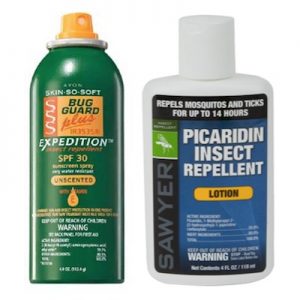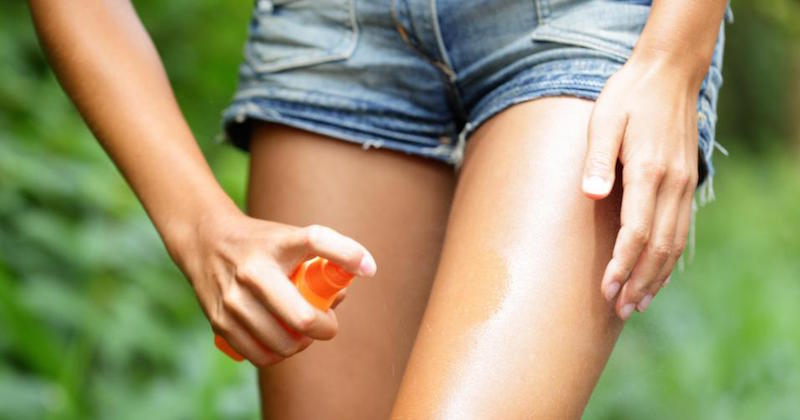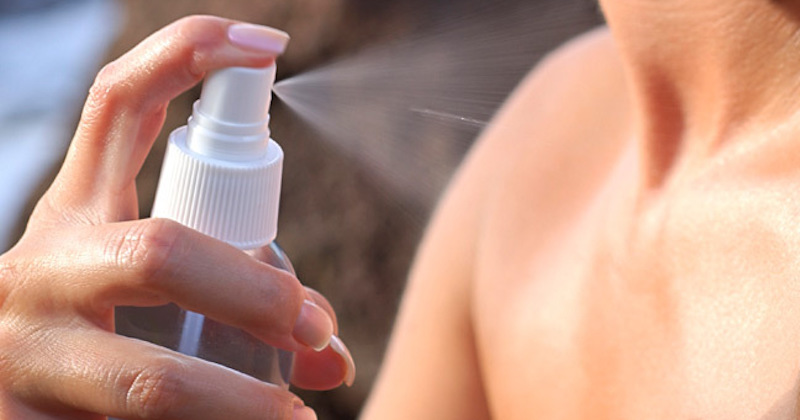DEET Use Linked To Headaches, Joint Pain And Memory Loss, Use These Safe Bug Repellents Instead
Last updated on
A summer necessity, bug sprays keep insects away—but is it also bad for our health? Researchers are debating whether the anti-pest sprays with which we douse ourselves are putting our health in danger.
One chemical found in many repellents is DEET (N, N-diethyl-m-toluamide). Developed and tested in the 1940s and 1950s by the U.S. Army for use in jungle warfare during World War II, DEET is extremely efficient at repelling mosquitoes, ticks, fleas, chiggers and blood-feeding flies such as black flies and deer flies.
In addition to popular forms such as aerosols and pump sprays, DEET is also found in towelettes, lotions, creams and gels. The chemical keeps insects away for hours after application and can be applied over sunscreen.
But as long as DEET has been around, it has raised questions over its safety from consumers and scientists alike. Some are bothered by the smell, while others complain that it irritates the skin; many have felt the burning sting of accidentally spraying bug repellent over a minor cut.
Although the Environmental Protection Agency re-approved the use of DEET in 1998 after an extensive safety review, new data suggests that the substance may affect our cells in unintended ways.
Why It Is Best To Avoid DEET-Containing Repellents
According to Dr. Mercola, “About 30 percent of Americans use DEET every year, but you should know that this chemical—though generally effective in keeping away insects—can have deadly repercussions. From 1961 to 2002, the Agency for Toxic Substances and Disease Registry reports eight deaths related to DEET exposure.”
Furthermore, a 2009 study found that DEET can interfere with the activity of enzymes that are vital for the nervous system to function properly. In the study, the researchers found that DEET blocked the enzyme cholinesterase, which is essential for transmitting messages from the brain to the muscles in insects. The researchers noted that DEET may also affect the nervous systems of mammals, and that more research in this area is needed.
The study, conducted by the Institute of Development Research in France, and published in the journal BMC Biology, found that chemicals that interfere with the action of cholinesterase can cause excessive salivation and eye-watering in low doses, followed by muscle spasms and in some cases, death.
DEET Causes Headaches Joint Pain And Memory Loss
Reports have shown that many who have been exposed to DEET have experienced a variety of side effects. These include:
- rashes
- transient numb or burning lips
- disorientations
- headache
- skin or mucous membrane irritation
- dizziness
- difficulty concentrating
- nausea
- hallucinations
In addition, Duke University Medical Center pharmacologist Mohamed Abou-Donia spent 30 years researching the effects of pesticides.
He discovered that prolonged exposure to DEET can impair cell function in parts of your brain—demonstrated in the lab by death and behavioral changes in rats with frequent or prolonged DEET use. Other potential side effects to DEET exposure include:
- memory loss
- muscle weakness and fatigue
- shortness of breath
- muscle and joint pain
- tremors
Another potentially harmful chemical found in many bug sprays is permethrin. This chemical is a member of the synthetic pyrethroid family, all of which are neurotoxins.
The EPA has even deemed this chemical carcinogenic, capable of causing lung tumors, liver tumors, immune system problems, and chromosomal abnormalities. Permethrin is also damaging to the environment, and it is particularly toxic to bees and aquatic life. It should also be noted that permethrin is highly toxic to cats.
Safe Alternatives To DEET
One of the newest arrivals on store shelves is picaridin, a substance derived from pepper that is popular in Europe and Australia. Studies by its manufacturer suggest that picaridin lasts for two to eight hours and is just as effective as DEET, is less oily and completely odorless. Independent studies by the EPA are underway.

A formulation that consists of 20 percent IR3535 is “very effective,” entomologist Daniel Strickman of the U.S. Department of Agriculture told LiveScience, a sister site of Life’s Little Mysteries. “It’s the only repellent active ingredient that has never caused an adverse effect.”
The EPA strongly recommends that consumers carefully read the instructions on bug spray products before using them in order to ensure that they are applied safely, particularly on children.
Other steps to ensure that you’re applying bug spray in the safest way possible include:
- Never apply bug sprays over cuts, wounds or irritated skin.
- Do not apply on hands or near the eyes and mouth, especially of young children.
- Do not allow young children to apply DEET products themselves.
- After returning indoors, wash bug spray-treated skin with soap and water.
- Heavy application is not necessary to achieve protection, so apply it sparingly.
- Do not spray in enclosed areas.
- Some bug spray products cannot be used on children under three years old, so always check the label to make sure.
BUY NOW:
| /td> |
Dr. Mercola says:
“Naturally, the best way to avoid mosquito bites is to prevent coming into contact with them in the first place. You can avoid insect bites by staying inside between dusk and dawn, which is when they are most active.
Mosquitoes are also thicker in shrubby areas and near standing water. The American Mosquito Control Association (AMCA) recommends the “Three Ds” of protection to prevent mosquito breeding on your property:7
- Drain: Mosquitoes require water in which to breed, so carefully drain any and all sources of standing water around your house and yard, including pet bowls, gutters, garbage and recycling bins, spare tires, bird baths, etc.
- Dress: Wear light colored, loose fitting clothing—long sleeved shirts and long pants, hats, and socks.
- Defend: While the AMCA recommends using commercial repellents, I highly recommend avoiding most chemical repellents for the reasons already discussed; try some of the natural alternatives instead, when necessary.”
Make Your Own Mosquito Repellent
One natural way to keep the mosquitoes from eating you alive to is make your own bug spray. To make your own all-natural DEET-free mosquito repellent try this recipe by Dr. Axe:
Homemade Bug Spray
Total Time: 2 minutes
Sprays: 30
Ingredients:
- ½ cup witch hazel
- ½ cup apple cider vinegar
- 40 drops essential oils (eucalyptus, lemongrass, citronella, tea tree, or rosemary)
- Glass spray bottle
Instruction:
- Mix all ingredients in 8oz spray bottle.
- Spray over all portions of the body but avoid repellent in eyes and mouth.
This article is shared with permission from our friends at livescience.com.
References:
https://articles.mercola.com/sites/articles/archive/2015/05/25/natural-insect-repellents.aspx
https://draxe.com/homemade-bug-spray/
Some of the links I post on this site are affiliate links. If you go through them to make a purchase, I will earn a small commission (at no additional cost to you). However, note that I’m recommending these products because of their quality and that I have good experience using them, not because of the commission to be made.


































 JOIN OVER
JOIN OVER
Comments